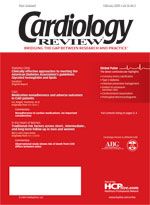Publication
Article
Cardiology Review® Online
Association of Black Cardiologists, Inc. opens International Library, Research and Conference Center for health care providers and the community
Scientists and health care prov­iders from around the world, who treat minorities diagnosed with cardiovascular disease, now have a place where they can assemble to study, exchange ideas, and conduct research. The As­sociation of Black Cardiologists, Inc. (ABC) officially opened its Inter­national Library, Research and Conference Center (ILRCC) with a ribbon-cutting ceremony on Friday, March 10, 2006, in Atlanta, Georgia (Figures 1 and 2). Fulton County Com­missioner Bill Edwards and other elected officials, ABC members, and invited guests celebrated the grand opening with a 2-day-long series of events.
The center was named in honor of Maynard H. Jackson, Jr, the former mayor of Atlanta. Jackson was elected the first black mayor of a major southern city in 1973, and was hugely influential in the development of modern Atlanta. He died of a heart attack in 2003.
The need for such a learning center has in­creased as the number of people diagnosed with cardiovascular disease grows. There are more than 70 million Ameri­­cans with 1 or more types of cardiovascular disease, which has an estimated dir­ect and indirect cost of $393.5 billion.
Among African Americans, for whom cardiovascular disease is the leading cause of death, the need for educational resources is even greater. More than 100,000 African Ameri­cans succumb to this preventable disease each year. Studies show that African Ameri­cans suffer from heart failure, a form of cardiovascular disease, at a rate almost twice that of Caucasians. Of the 5 million Ameri­cans diagnosed with heart failure, about 750,000 are African Ameri­cans, a number expected to increase substantially to nearly 900,000 by the end of the decade.
The ABC will use the ILRCC to host national lectures and conferences de­signed to educate health care providers on interventions in cardiovascular disease prevention and management. In addition, the ABC will open its doors to the community by hosting workshops and training sessions on the importance of diet and exercise, controlling blood pressure, and maintaining healthy cholesterol levels.
“For more than 30 years the ABC has been dedicated to eradicating cardiovascular disease within our communities. The establishment of our International Library, Research and Conference Center will afford us the opportunity to extend the numerous programs and services we currently provide to health care providers as well as to the community,” says Paul Underwood, MD, President, As­socia­tion of Black Car­diologists, Inc.
This planned provision of care to physicians and the community began on opening day and continued the following day with a mix of activities. The ABC’s 19th Annual Scientific Sessions, held on March 11, focused on “New Per­spec­tives in Cardio­vas­cular Medi­cine with Emph­asis on Sci­ence, Evidence and Treatment Stra­teg­ies,” and featured a distinguished faculty of 16 offering parti­cular coverage of topics in­cluding assessment and man­­age­ment of car­dio­vascular risk factors and heart failure, cardiac imaging, and arrhythmias. The day closed with the ABC President’s Award Gala, a black-tie affair that featured top-notch entertainment.
The ILRCC is located 7 miles south of Atlanta’s Hartsfield-Jackson International Airport on 125 acres of rolling countryside, overlooking a 30-acre lake. In addition to housing the ABC’s international headquarters, the 40,000-square-foot building features a Symposium and Perfor­m­ance Theatre, Ballroom, and an Atrium. Future plans for the center include a Cardio-Health and Rehabi­lit­ation Center with state-of-the-art equipment and a Cardio­vascular Learning Center, an interactive facility designed to educate children and adults on the intricate mechanics of the heart. Visitors will be able to see human physiology models with authentic and simulated organs. For additional in­formation on the center, please visit
Our 7 Steps to Good Health
1. Be spiritually active
2. Take charge of your blood pressure
3. Control your cholesterol
4. Track your blood sugar
5. Eat smart and enjoy regular exercise
6. Don’t smoke
7. Access excellent health care and take all medication as prescribed






